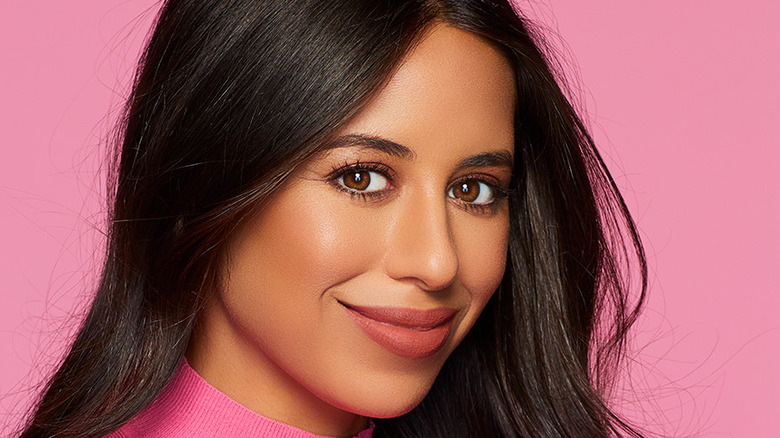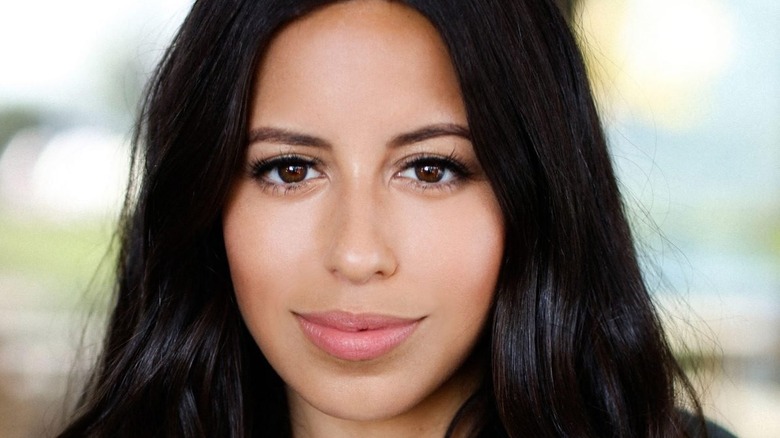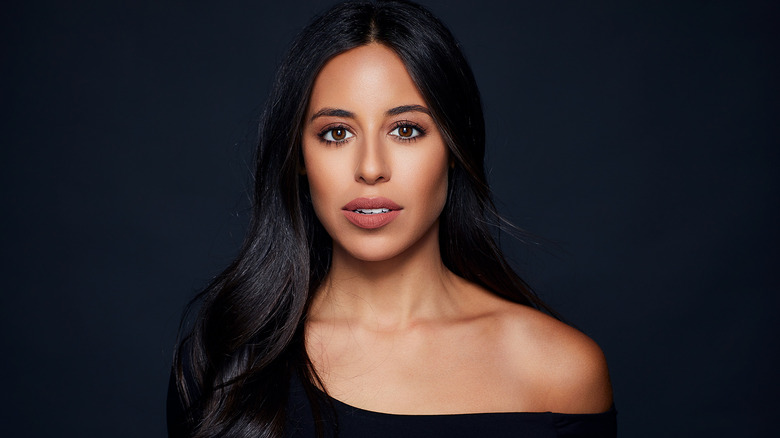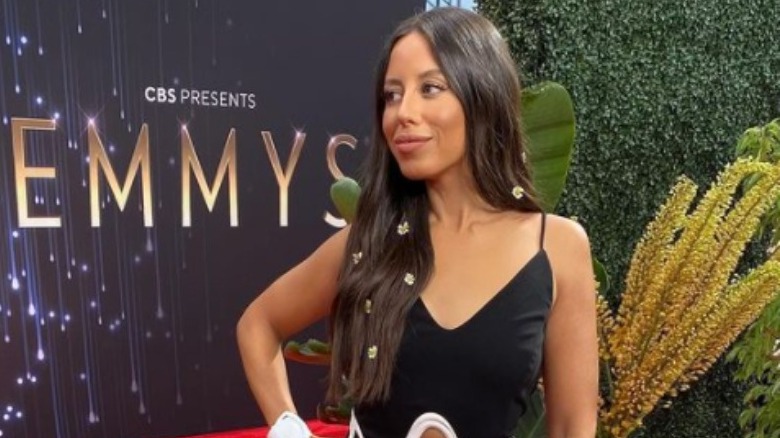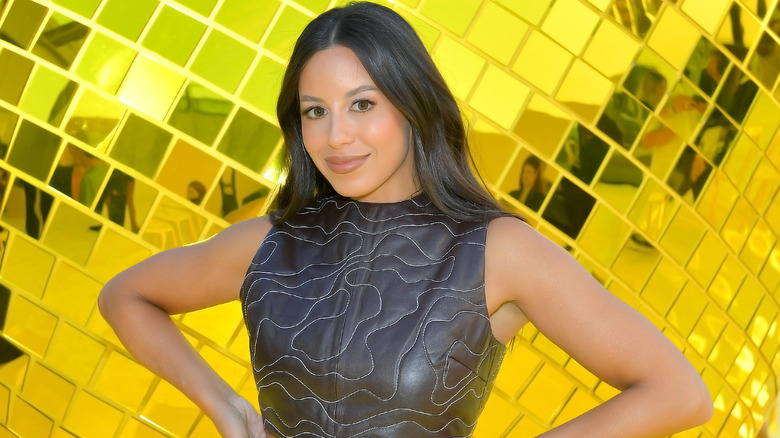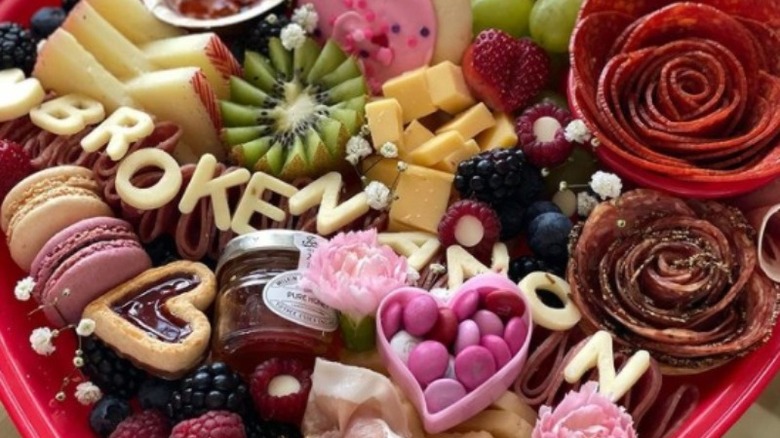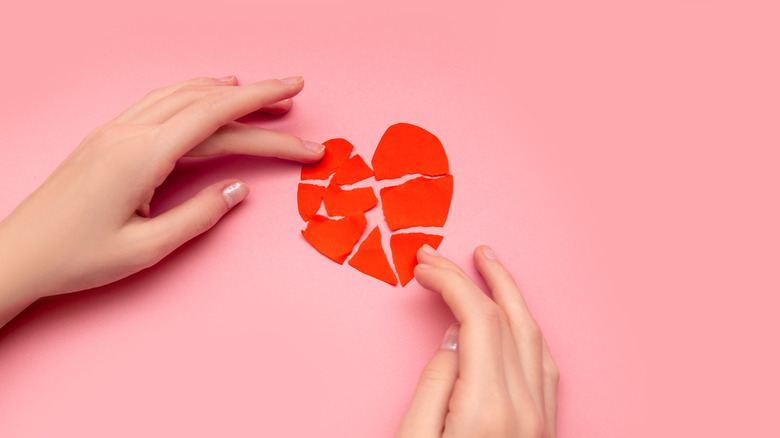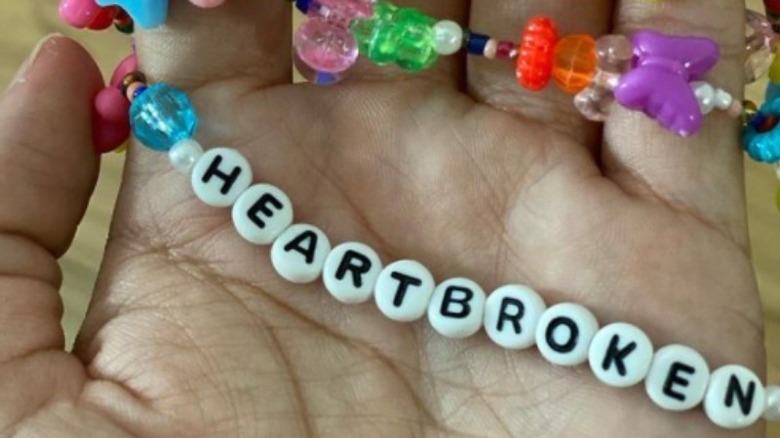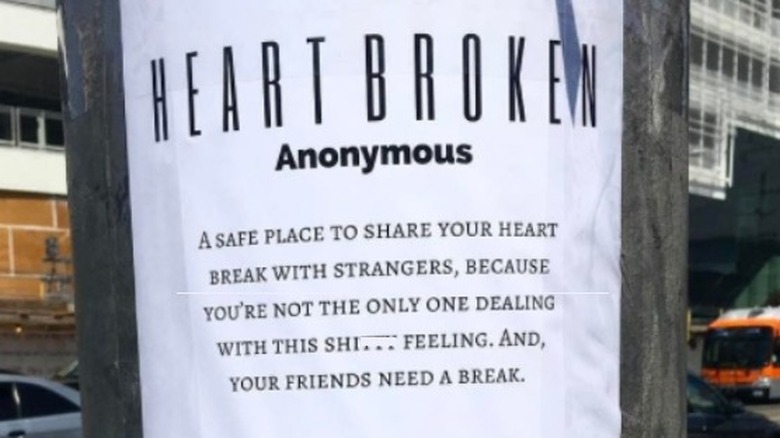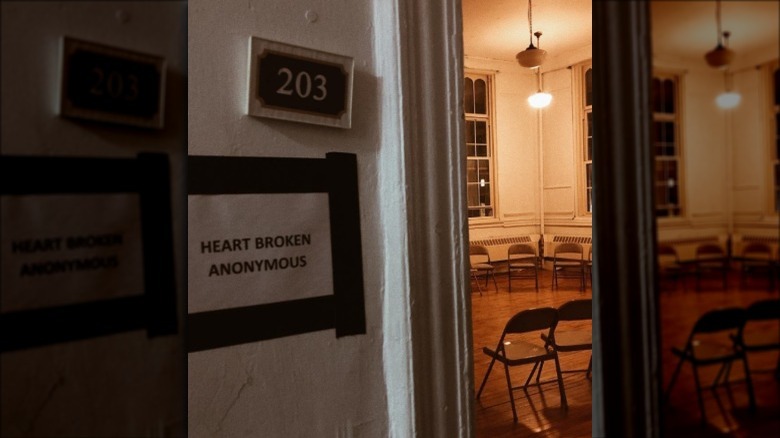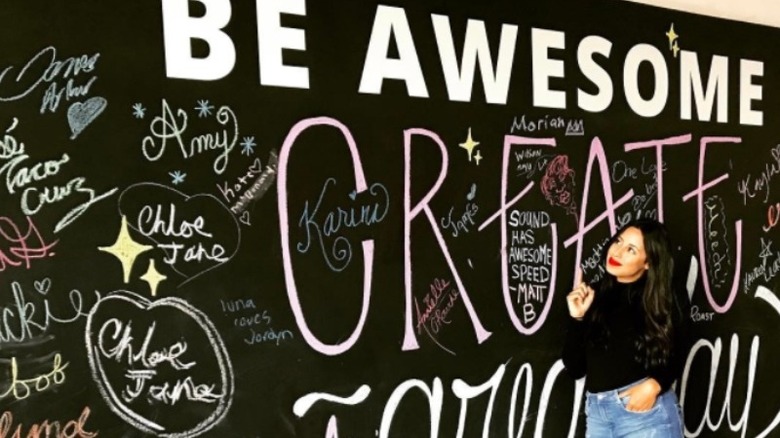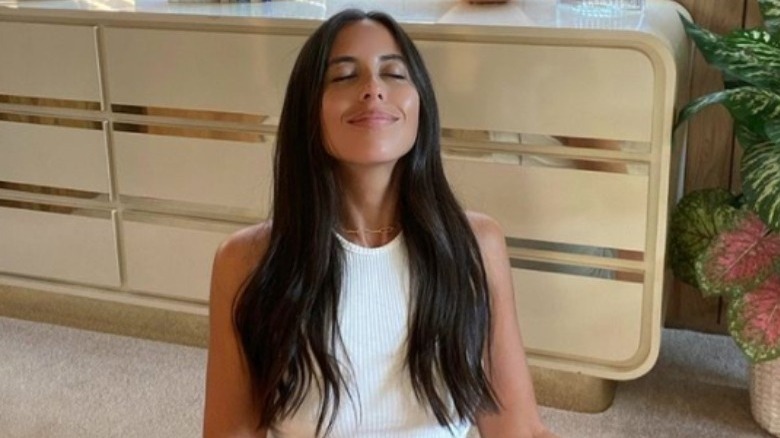Former Bachelor Producer Naz Perez On Founding Heart Broken Anonymous – Exclusive Interview
Naz Perez is a pro in love ... and heartbreak. She spent two and a half years as a producer on "The Bachelor" and "The Bachelorette" professionally fostering love, but her fascination with love started long before her career in reality TV. Perez has always been fascinated with the things love does to us and what love makes us do.
After her first real heartbreak, Perez realized that the grief of losing a relationship — romantic or otherwise — can be debilitating. She also discovered that there isn't a lot of support for people dealing with heartbreak. And so, she started Heart Broken Anonymous, a support group for people who are dealing with any kind of heartbreak — the loss of a loved one, the loss of a romantic relationship, the loss of a best friend.
In an exclusive interview with Health Digest, Perez revealed how love has driven her career, why she created this special support group, and what she's learned about love from heartbreak.
Making it in Hollywood
Tell us a little bit about your career. You have quite a resume.
I majored in broadcast journalism in college, and I always wanted to be a sports reporter. Then I changed my mind when I saw Giuliana Rancic's "True Hollywood Story" on E!, and I was like, "Oh, that's what I want to do."
After an internship at "Ellen" and working as Giuliana Rancic and Ryan Seacrest's production assistant, where she worked the SAGs, Oscars and, Grammys, Naz Perez realized she wanted to be on camera.
I started to get into the fashion side of sports ... but eventually E! was hiring in their "True Hollywood Story" department. Funny enough, I ended up working there, worked my way up to be an associate producer, learned how to tell a story, and make a documentary. At the end of 2014, we all got laid off.
Eventually, though, Perez was able to land a dream job in reality TV.
[The Bachelor] took a chance on me. For two and a half years, I worked on seven seasons of "The Bachelor," "The Bachelorette," and "Bachelor in Paradise." I would say ... I'm biased, but the best seasons in modern day.
It was incredible. ... I was interviewing people about love and heartbreak. I was learning so much about myself. I was learning so much about love, and I was also learning how to be a great interviewer because — there are two types of producers; there are date producers and cast producers. I'm one of the only people that's been in both departments. I was like, "While I'm here, I might as well learn how to get a soundbite and how to interview because I want to host one day."
Leaving The Bachelor and experiencing heartbreak
Naz Perez on leaving "The Bachelor":
I left "The Bachelor," which was really hard to do because I was making a lot of money, and I was 27. Then all of a sudden, I was unemployed and I was this person that wanted to be a host.
I think I realized that I equated my success with happiness, my work success. ... We live in a society where people just want to know what you do as opposed to who you are as a human, and so I would go from telling people "I'm this producer on 'The Bachelor'" to "I want to be a host."
2016 was a very hard year for me. My parents asked me for money, and I was like, "Should I have left this job where I was making good money to pursue this dream?" It was a weird time, but I had met this person [and we dated] for six months. I never really knew if he was my boyfriend. It was very much living in the gray. I didn't know if we were exclusive or not.
Naz Perez analyzed her heartbreak:
I started doing research, and I found out that the same part of your brain that lights up when you're going through physical pain is the same part of your brain that lights up when you're going through emotional pain. I was like, "Whoa, this could literally feel like a punch to the stomach."
[In] that unemployed time in my life, that's where the idea of Heart Broken Anonymous was born.
Things are looking up...
Currently, I'm a host for Rotten Tomatoes, E! Entertainment for their "Live from the Red Carpet" shows, and the Dodgers. Then I have my own podcast called "I Don't Get It" with my friend, Ashley Iaconetti, who was on "The Bachelor" — I was her producer. We've been doing that for four years, and then also running Heart Broken Anonymous. Yeah, so all amazing things and a lot. I know that was a mouthful, but that's the short version of the very, very long story.
Full circle. Congratulations.
'How far can I go?'
How did you make those opportunities happen for you? Is there a secret to your success, or did you find that more of it was just circumstantial?
I love this question because it makes me think of the Elon Musk tweet from 2020 where he literally tweeted, "I'm working 16 hours a day, seven days a week, 52 weeks in a year, and people still calling me lucky." ... I don't think that we should wear busyness as a badge of honor. ... I have an incredible work-life balance, and even though I do a lot, I don't think we should just take on a lot and equate that with success, but I share that tweet because it's true. I put in the work. The time I have off, I'm reading about how I can make Heart Broken Anonymous better, and so I'm using every opportunity I can to essentially better myself.
I think I remember reading this too, that in the 1800s, Thomas Edison wasn't the only person that was working with incandescent light at the time, but he was the only person that tried 6,000 different filaments. I'm a trial-and-error [person] and I'm not scared of rejection. ... I ask for things. I'm prepared at the moment, but I'm like, "Hey, do you have anyone covering this? I want to do it." I throw my name in the ring. I'm not scared of rejection.
And then I think as far as the secret part of the question goes: A lot of people, when they make goals, ask themselves, "How long is this going to take?" Right? It feels like this uphill thing — especially in my industry. I just hear conversations with people that are on camera, Robin, and they're just like, "Oh, when am I going to be discovered? When am I going to be 'it'? When am I going to be ..." I really shifted that mindset.
First of all, I never really had that mindset — but it's easy to get lost in it. For me, instead of asking myself, "How long will it take?" I started to ask myself, "How far can I go?" I just approached it with this open and fun and playful curiosity — and this welcoming energy — instead of this 'got to get up the hill' energy. I get excited about my work, and I'm like, "What can I learn? What's going to happen?" I think that a lot of my secret, I guess, is just the mindset of how I approach where I want to go.
Perez's fascination with love
You said before that one of the reasons you decided to pursue the job at "The Bachelor" was because you've always been intrigued by love, what it is, how it happens, how it impacts us. Can you elaborate on that a little bit?
Yeah. When I said that, I was mainly speaking to this fascination I have with how love can motivate us to do certain things whether. As a host of the Dodgers, I would meet fans, Robin, that have been fans of the Dodgers since they were three, right? They were born into it, and then they had this partner — whether it was a wife, a husband, or whoever that was now just a Dodger fan, a diehard Dodger fan. I'm like, "This is all born out of love, really, right?" This is just love for the other person. You're taking this on.
People move across the country, and I think research has found that when we are in love, we are motivated to attract or please a person with whom we are in a relationship. When you do that successfully, the brain releases dopamine, which is a neurotransmitter that is very vital to reward motivating behavior.
I think my favorite example of this — because I cover E! News on the weekends — is Travis Barker. [He] was involved in a deadly plane crash in 2008. He swore to himself that he would never fly again. He meets Kourtney Kardashian, falls in love, and she says, "I really want to travel with you" and he gets back on a plane. ... It's fascinating what the power of love can have over us when it comes to motivating us to do certain things.
How did that fascination with love tie into the creation of Heart Broken Anonymous?
[I] ended up starting Heart Broken Anonymous because I needed it — because I was feeling destitute, because I thought it was crazy that there was nowhere to go. I mean, I just started taking donations in 2020, but it was free for three years because I was just like, "There should be somewhere people can go to feel relief and to feel better.” The fascination that I have that sparked out of that is I was like, "Well, heartbreak is inevitable. We're all going to feel heartbreak at some point in our life, and we need heartbreak in order to feel what love is, but how can I make people feel better?"
I started doing more research, and we are in this epidemic of loneliness. People don't talk about it enough, right? We were just talking about a pandemic, but in 2017 Vivek Murthy, who was the 19th U.S. surgeon general under Obama declared [a loneliness epidemic]. ... The U.S. Surgeon General [goes] around the country and basically decides what one thing is that they're going to tackle during their term. In the past, it's been things like obesity, or maybe it's been drug use, and his was loneliness.
No one really took the time to let that sink in. What can we do to make people feel less lonely? I think under heartbreak, under addiction, under anxiety, under depression, under violence, is loneliness.
Naz Perez's 'recipe in the cauldron'
Naz Perez longed to help:
How can we make people feel less lonely? How could I make Heart Broken Anonymous, this anti-lonely lonely club? Well, research finds that when you're just around another person, you can just feel happier. ... Nick Epley did this study in the Chicago transit system ... Typically when you get on a subway, Robin, we all just want to find a chair by ourselves, away from everyone because we think it's going to be more peaceful, right? We think we're going to enjoy our work commute more. Well, it turns out when they would talk to people at the end of the commute, the people that sat next to a stranger and made a connection actually reported feeling happier. One, just being around strangers can actually make you feel happier.
This was further proven by the study done at MIT where they put two pieces of chocolate in a room, and they had one person go in and taste it. Then they had two people go in and taste it at the same time, and those two people reported it feeling more delicious, meaning we feel more enriched when we're around other people.
Also, reminding yourself that you're not alone because when heartbreak is happening to you, we tend to think it's just happening to us. We don't care what's going on with our boss or with our friend — I'm going through a breakup right now, or my dog died, or I had a miscarriage, and that is it.
When you come to Heart Broken Anonymous, you remind yourself you're not alone. By listening to someone else's story, not only are you feeling the catharsis of sharing what you actually feel in a safe space, you're also doing something really nice for someone else, and when you feel like you matter, like you're doing something good, that makes you feel good.
That was my recipe in the cauldron — let's put strangers together, let's remind them they're not alone in this loneliness epidemic, and let's make them feel good as if they're giving back while they're also sharing in a space, and feeling what they're actually feeling, and feel safe to feel what they're actually feeling. My fascination with love led to me researching all those things, and that's how it led me to create HBA.
How heartbreak changes our experience of love
Sometimes experiences of heartbreak can sour our perception of love. What was your experience? Did your perception of love and your fascination change with this heartbreak?
Yeah. Heartbreak broke me open. It sounds so cliche, but it happens to all of us, right? When I think of heartbreak, I just visually think of this heart breaking in half and just leading me on the path to loving myself more. That's really truly what it is.
How did it change my perspective? It showed me that it's necessary because, without heartbreak, I wouldn't know what love is, and I think we tend to forget that. When I sit down and talk to people all the time, people are like, "What are five ways we can get over heartbreak?" I'm like, "No, that's not the point." You need to feel this in order to feel what love is, so I learned, and I'm still learning to let contrast be my friend, that feeling heartbreak isn't bad. Feel it.
A teacher of mine put me onto another teacher of theirs who so perfectly said it, and I want to read it just so I don't mess it up. They said, "How would you ever come to any conclusion of preference if you did not have variety that helped you to decide and discern?"
I was like, "All of these heartbreaks are leading me to that great love within the great love I will receive one day from another person and the great love that I know I can give myself." I just thought that's such a beautiful line. It just really taught me that it's necessary, and I'm not resisting it anymore. I like feeling it, and I like processing it because it's just adding to the list of things I do like.
That's beautiful.
[I] love superheroes and Vision [from "WandaVision"] is an Avenger. I don't want to give too much away, but ... Vision has this one line, which I think is so beautiful. He says, "What is grief if not love persevering?" I love that line.
Absolutely. You touched on this ... but how has learning to love yourself changed the way that you're capable of loving others?
Yes. It's funny because I actually think it's the opposite, Robin, because I was thinking about how I wanted to answer this question, and I think loving others taught me how to love myself, right? How many times have we been helping out a friend that's been crying, or upset, or whether it's a little kid, and you just all of a sudden become this perfect shoulder to lean on.
You're like, "It's going to be okay. You're going to get through with this. You're beautiful. I wish you could see how beautiful you are to me. I wish you could see that for yourself." In loving other people, I started to ask myself, "Can I do that for myself?" The answer is, yes, we all can because when you love yourself, you're in true alignment because, at our core, I believe that we are just love.
I actually think it's the opposite for me. I think loving other people taught me how to love myself. I was like, "Oh, I can do this for Naz. I can be that parent and that friend that I never have or don't have in the moment."
Heart Broken Anonymous meetings
So, give us a picture of a Heart Broken Anonymous meeting. What happens? What do you talk about? What are you doing in the meeting?
Basically, it's unlike AA, and Al-Anon, and other support groups like that because it's not a 12 step program. I'm not a licensed therapist. I'm not here to give advice. This isn't a place you come to get advice, and what's really cool is I'm adding HBA ambassadors, so now other people are leading.
In-person meetings:
In person, people just come in and we sit in a circle on the ground and a moderator starts the meeting. They explain why Heart Broken Anonymous was started [and] what heartbreak is. ... When you Google what heartbreak is, the official definition is "overwhelming distress." I think when we think about heartbreak, we think of a girl getting dumped, eating ice cream in bed, wearing matching pajamas, and that's not what heartbreak is.
Heartbreak is anything causing you overwhelming distress, so we explain what heartbreak is, which could be anything, racial injustice or like I was mentioning before, your dog dying, the loss of a job — maybe you just have heartbreak within yourself. It could be anything that's causing you distress. Then we read over our rules and traditions.
A couple of them I'll share with you: "Sharing is encouraged, but is not required," so you can come to Heart Broken Anonymous and just listen. I like sharing that because it can be intimidating to be in a circle of people. Sharing is not required. You can come, and just listen, and just share space with other people, and be there for other people. "Crosstalk is not allowed to ensure that it is a safe space." ... Then after the rules and traditions are over, we just go around in a circle and share stories of heartbreak. Everyone has about four to five minutes to share their story — I don't time people — and then at the very end of the meeting, we go back around one more time and briefly share something we're grateful for.
Then people have time to connect afterward, and that's really the whole point, right? Pre-COVID, people would go get coffee together, people would exchange numbers, and true friendships and relationships were formed, which for me was just the coolest thing to see people walk in a room as strangers and leave as friends. There's no better feeling.
Virtual meetings:
When the pandemic hit, we shifted to virtual meetings on Zoom. What's incredible about Zoom is now people all over the world can join Heart Broken Anonymous, which has been the coolest thing ever to be in a meeting and hear people from Canada, and Spain, and Mumbai, and literally Boston, New York, Chicago, Miami come and share stories of heartbreak.
It's even more anonymous because you can turn your camera off. You can actually change your name, and maybe it's a little better because you could be in your car, on your lunch break, and join the meeting, or you can be in bed. Those are some of the things that the virtual meetings offer that the in-person can't, but of course, at the end of the meeting when we go around and share things we're grateful for, we give people a moment in the chat feature to share their contact information if they'd like to connect with someone whose story resonated with them to keep that connection going.
'There's no algorithm to grief'
Can you explain the crosstalk bit a little bit, because I think that's a very interesting piece of this. Usually, when we're listening to heartbreak stories, there's a lot of advice-giving.
I love that. Thank you for that question. I really appreciate it. Yeah, that's really the whole ethos of Heart Broken Anonymous is come here, and say, whatever is on your mind, and you're not going to get feedback unless you ask for it because I have found that a lot of the times people just want to feel validated. But in turn, that means that you're not going to hear someone say, "Oh, that was really tough," either, right?
I was talking to a friend who recently came who went and spoke to their therapist and thought that was an interesting element. Their therapist told them it gives you the space to create internal validation for yourself, where you're at, and how you're feeling. I think the power in no crosstalk is you just don't feel judged.
I think what's so sh***y about heartbreak is that we judge ourselves for heartbreak. People are like, "Oh, I can't believe I'm still feeling this way" or they're mad that they're still upset about something, and there's no algorithm to a breakup. There's no algorithm to grief. There's no word in a book that says, "You dated this person for three months, therefore six months and 24 hours and seven minutes from today, you will wake up and feel over it." That's not how it works. Healing is not linear, and I think it's worse that we make ourselves feel bad on top of already just feeling the heartbreak. You don't have to judge yourself for it. ... Sometimes our friends are sick of listening. Even when we have good friends and support, our friends are like, "All right, I don't want to hear this anymore." Come to HBA; we want to hear you.
The power of talk circles
HBA partially, at least, came out of the fact that therapy is cost-prohibitive for some people. What's the difference between coming to an HBA meeting and going to a therapist? What space is this filling that going to therapy might not?
Well, I think it gives you community. ... Sometimes I share a quote by Gloria Steinem in the beginning of the meetings where she says, 'We're communal animals. If left by ourselves, we can feel wrong, and crazy, and out of step with society.' This is why we need those talk circles. We all have this inner sense of belonging. We evolved as a species because we work together. A lot of people think we evolved ... because we got stronger, or we ran really fast. In actuality, we evolved as a species because we started to work together. We're like, "Hey, you hide behind that rock" and obviously the physics of throwing helped a lot too, I think, but aside from that, it was working together.
'All right, you're going to trap this animal over here. I'm going to do this' — and so we have this inherent need to feel like we belong and to feel at home. What is home? Home isn't a place. Home is just where you feel understood, and so HBA is a home for people that are feeling overwhelming distress.
That is a feeling you're not going to get from therapy. Listening and sharing stories of heartbreak reminds you that you're not alone. Like I mentioned, it's not somewhere where you're going to get advice like you would in therapy. No one's going to say anything that's going to make you feel worse. Like I mentioned before, you're choosing to share your story. Not getting an external response helps you essentially build internal validation for your own experiences.
What is this power that comes from sharing personal stories with other people who are feeling the same way as you?
I think it reminds you that it's not just happening to you, and that you're not by yourself because we can feel so alone in the journey of grief. So often the questions I hear people say out loud often are "How can I make this feeling go away" and "Is it ever going to go away? No one understands how I feel."
It's true that there are scenarios where people have unique pain, but you can come to a meeting and realize that just the pain of grieving, the pain of loss, is a universal thing that we all feel. There's power in that. There's power in having a sh***y day, and grieving, and having no hope, and then coming to a place where the one requirement is to have hope.
Fostering hope
Hope is a big focus in the meetings — why that focus on hope as opposed to something else?
Well, I was thinking long and hard because when I was creating it I was like, "The last thing I want is for people to just come and just be like, 'Life's never going to get better.'" It was tricky. I was like, "I don't want to create a pity circle. I want to create a real space where people are sharing real feelings."
The one requirement for me was to have hope, and what is hope to me or to Heart Broken Anonymous? Hope is faith that good can be derived from painful situations and lead to personal growth. To me, hope provides relief. I believe every human on this planet wants to feel relief. It's the reason why when I got dumped, I think for a month, Robin, I Googled how to get a Taurus man back!
I love that.
I laugh so hard thinking about it. For a month before bed, I would read articles about how to get a Taurus man back, and then I look back, and I'm like, "What was that really? What was under that?" I wanted relief. I just wanted something to alleviate the pain, and my Tylenol was astrology articles.
Hope can provide relief, and I'm not in the fixing business, like I tell people. I love healing. I love my own spiritual healing journey. I've done a lot of things to heal. I still don't think I'm the person to tell everyone else how to heal. I'm very wary of people that think they have all the answers. We are just here to provide relief, and that is what hope provides.
Embracing hope is probably the most important thing we need to actually maintain a healthy brain and lifestyle. When I was researching this, [I found] hope stimulates the decision and problem-solving abilities in your brain. Not only that, it stimulates your immune system, it motivates you to take action, and — get this — it turns off the worry centers in your limbic system and your right prefrontal cortex.
Without hope, you can easily slip into depression, and the brain begins to shut down. That's a big reason why we go around and share gratitude, too — because they're not the same thing but they can go hand in hand. Knowing things are sh***y now, but that they're not always going to be sh***y, I think is helpful.
Gratitude matters
To go right into the gratitude at the end of the meeting, why was that so important to you when you were creating this format?
In the same way that hope can really help you physically — I'm sure you know this by writing so many articles — there's so much science behind gratitude that it's endless. I could talk about gratitude for an hour, but we know that it can improve your mental health, your immune system, again your overall well-being, and it can increase your happiness. The watered-down version of it is that when you're expressing gratitude, you are spreading positive feelings.
I like to use [gratitude] at the end of meetings to remind people that you can actually access that at any point in time, right, because when we're going through the group and we're like, "Oh, this is it. I'm sad right now" — and it's okay to be sad. I want you to be sad. I want you to feel and process — maybe not forever, and ever, and ever, and ever, and ever — but I want you to feel validated, and seen, and heard. ... What people share they're grateful for is so incredible.
I remember one time, a woman shared that she was grateful for cereal. I love that so much, how cereal just brought her so much joy, and immediately you just see smiles on people's faces. It's this reminder that we can access that at any time we want to.
Is there anything that you've learned about heartbreak from running these meetings, or from going through your own heartbreak, that you really think people need to know?
Yeah, I can sum it up in one line for you: What I would like people to know is you can't have one without the other.
You can't have love without heartbreak, and so I say, embrace it. I say, feel it, don't run away from it. Process it, accept it, come to Heart Broken Anonymous, share it with other people. I've quoted this one time before, and it's just so good, and I love it so much. Maybe it's because I just got back from Kenya a couple of weeks ago, but Rafiki from "The Lion King" — I've always loved him; I was so happy to learn last month when I was there that Rafiki means "friend" in Swahili — says, "The past can hurt. You can either learn from it, or you can run from it." My hope is that people come to Heart Broken Anonymous and learn from it.
Visit HeartBrokenAnonymous.com to find upcoming meeting times. Heart Broken Anonymous is hosting a special meeting on Valentine's Day for those who need support.

